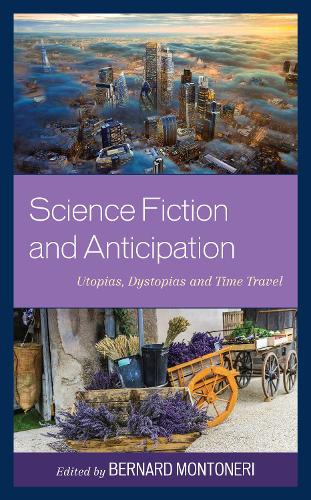
Science Fiction and Anticipation: Utopias, Dystopias and Time Travel
(Hardback)
Publishing Details
Science Fiction and Anticipation: Utopias, Dystopias and Time Travel
By (Author) Bernard Montoneri
Contributions by Majed S. Al-Lehaibi
Contributions by Miguel ngel Gonzlez Chanda
Contributions by Beena Giridharan
Contributions by Fernando Daro Gonzlez Grueso
Contributions by Michaela Keck
Contributions by Bernard Montoneri
Contributions by Murielle El Hajj
Contributions by Akiyoshi Suzuki
Contributions by Anna Toom
Bloomsbury Publishing PLC
Lexington Books/Fortress Academic
12th August 2022
United States
Classifications
Professional and Scholarly
Non Fiction
Literary studies: c 1600 to c 1800
Literary studies: c 1800 to c 1900
Literary studies: c 1900 to c 2000
809.38762
Physical Properties
Hardback
262
Width 157mm, Height 237mm, Spine 21mm
526g
Description
Science Fiction and Anticipation: Utopias, Dystopias and Time Travel presents ten chapters discussing themes related to time travel, utopias, and dystopias in science fiction novels published in America and Europe between the 18th and 20th century. These themes include social progress, freedom and human rights, technological advances, and the issues of ethics, racism, sexism, censorship, and slavery. The contributors analyze novels such as The Year 2440 published in 1771, Paris in the Twentieth Century written by Jules Verne, Blake; or, The Huts of America by Martin Robinson Delany, The Amphibian Man by Alexander Belyaev, Heart of a Dog by Mikhail Bulgakov, Ashes, Ashes by Ren Barjavel, The Machine Stops by E. M. Forster, Morels Invention by Adolfo Bioy Casares, and writers of Spanish, Argentinian, English, and French fictions such as George Orwell, Eduardo Ladislao Holmberg and Leopoldo Antonio Lugones Argello. This book notably presents their sources and influence, the accuracy of their predictions, and their relevance in our very unstable world.
Reviews
This book is a landmark work of literary studies. Science fiction, as the name implies, usually evokes an impression of a scientific aspect that is far removed from human nature, but this book suggests that this notion is not accurate. In particular, Chapter 3, which deals with dystopian fiction, addresses issues of human rights and discrimination against African Americans. This book offers a new perspective on the field of literary studies.
-- Yoriko Ishida, Oshima CollegeA timely and increasingly relevant study, Science Fiction and Anticipation: Utopias, Dystopias and Time Travel not only contributes significantly to what is a diverse and compelling field of research, but also delves into the SF genres metamorphoses in our COVID-19 world. In its analyses of Proto SF to 20th century SF texts, this study draws exciting parallels between our present reality and those imagined, not-so-distant, futures.
-- Eleanore Gardner, Deakin UniversityThis volumes ten chapters by contributors from around the world makes an effective case for the literary, cultural and even philosophical importance of science fiction. Its explorations of key themes and ideas range across the varied modes of the genre, exploring its cross-fertilizations with realism, fantasy, childrens literature, the detective and the adventure novel. Underscoring these analyses are questions concerning the very terms with which modernity addresses its present and future. Particularly impressive is how each chapter addresses science fictions Promethean warnings of the dangers of technological and positivist overreach, and how these infect capitalism with a utilitarianism that would strangle not only social advancement but also the arts themselves. One key argument of the volume is that dystopias emerge in response to a utopian texts implicit critiques of capitalisms amplification of the Industrial Revolutions inequities. Also impressive is the wealth of information about the authors, texts, genre definitions, subgenre distinctions, critical responses, and the depth of historical and cultural contextual detail.
-- Myles Chilton, Nihon UniversityAuthor Bio
Bernard Montoneri is independent researcher in Taiwan.
